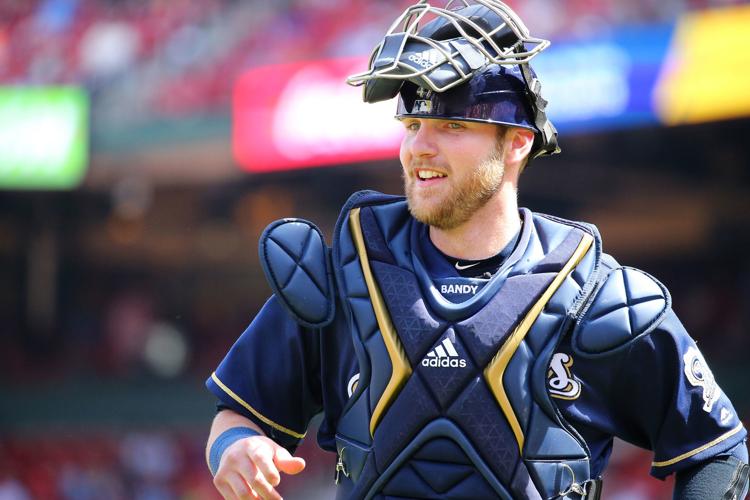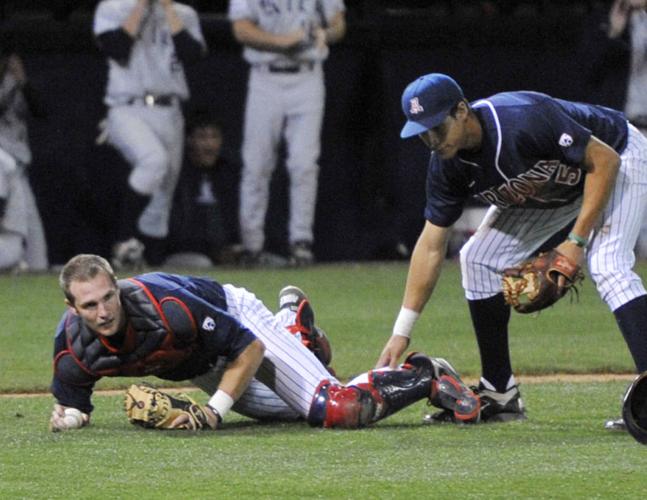NEW YORK — The life of a backup catcher is one of great lore, of sunflower-seed-spitting antics, endless hours in a dugout and a start or two per week.
It’s been called one of the cushiest jobs in sports, akin to a backup quarterback.
They are often some of the most colorful personalities in a clubhouse. For them, a sense of humor is often second to a good arm and a little pop with the bat.
Former Arizona Wildcat Jett Bandy is no different.
Well, no, he is different.
These days, Jett Bandy is no backup catcher.
A strain – and then a break
Bandy bounds back from treatment because even though it’s just a few weeks into the long baseball season, a catcher’s body is his temple — and this temple needs some oil in its bones. It’s a frigid Sunday at New York’s Citi Field, hardly baseball weather, but Bandy’s playing.
Bandy stretches his shoulder a few times and cracks his neck. He’s 28 years old and in peak physical condition, but try catching six straight games and see how many times your bones creak.
“It’s a long season, you want to make sure you stay healthy,” he said, contorting his body. “That’s the No. 1 thing. You get into August and September, you’ve taken a lot of swings. You work on the quality of the work, not just the quantity. I kind of like when I’m a little fatigued. It settles me. I’m not so antsy.”
These days, Bandy is more than just a little fatigued.
Bandy would have likely been a spring training casualty had it not been for an injury to Milwaukee’s Stephen Vogt, a two-time All Star. Bandy opened the season behind starter Manny Piña. Then Piña exited the Brewers’ April 10 game with a calf strain; the injury didn’t improve, and on Monday, Milwaukee placed its top healthy catcher on the 10-day disabled list.
That left Bandy to man the job, practically by himself. He started the Brewers’ next five games before receiving a day off Tuesday. (The Brewers gave rookie Jake Nottingham his first start). Bandy was back in the lineup Wednesday against the Reds, where he went 2 for 4 with a run scored. Bandy is hitting .233 with a home run this season, but his value is measured in more than offensive stats.
“The catching position, how physically and mentally taxing it can be, a lot of time it indicates rest and freshening is better,” Milwaukee manager Craig Counsell said. “Jett is in a spot now when he’s playing a lot for us, four or five days in a row, but he can certainly handle it.”
This is Bandy’s most work since the middle of 2016, when he was a rookie for the Los Angeles Angels, a half-decade removed from a three-year career at Arizona.
Bandy was a beast during his career with the Wildcats, batting over .300 — including .354 as a sophomore — while homering 11 times with 121 RBIs. The Angels took Bandy with their 31st-round pick in 2011.
Bandy made his big-league debut in 2015, but received just two at-bats — one of which he turned into a home run.
For the last few years, he’s bounced between Triple-A and the majors, staying ready, biding his time, becoming a presence in the dugout.
All for days like Sunday.
A people person
The job of a Major League Baseball catcher is one of great complexity, of human bonding, of endless hours in a dugout and film room, learning from pitchers whom you might only catch once a week.
Bandy is always at the ready, knowing how close regular playing time might be.
Vogt, who will likely platoon with Piña when he returns from injury, puts it succinctly: “You’re one foul tip away from contributing every day.”
Those other days, though, he said, you’re thinking: “How can I help the team get better today, even if it might not be on the field during a game?”
Outsiders may only value a ballplayer based on a handful of at-bats and defensive situations. Inside a clubhouse, however, a backup catcher is a glue guy — as necessary as he is valuable.
“Jett is definitely a valuable player in many ways. Not just defensively …” Brewers pitcher Brent Suter said. “He’s a great clubhouse guy, probably the funniest guy on the team.”
Bandy says he’s “kind of mastered” the interpersonal part of his job.
“Every pitcher is different. Some you have to pat on the back, some you have to get into a little more,” he said. “You have to go out there and know who you’ve got out there on the mound.”
Bandy’s easygoing attitude dates back to his high school days in Thousand Oaks, California. He played against current Brewers teammate Christian Yelich, a star at rival Westlake High School. But it was really codified in the winter of 2014, thousands of miles from home, when the dog days of baseball really took their toll. After playing a full season of Double-A ball, Bandy traveled to the Dominic Republic for winter ball. There, he finally learned to take each success — and failure — with a grain of salt.
“I was away from home, a different country, never been there before, and I was playing so much baseball, it was almost to the point where it was like, ‘this is getting old,’” he said. “I just learned to just go out there, do what you can do, learn to accept failure. Know it’s going to happen a lot, and you’ll be better in the long run.”
‘A serviceman
to the pitcher’
Former Wildcats baseball coach Andy Lopez used to tell anyone who’d listen: Grow up to be David Ross. Forget the limelight, forget the endorsement deals. Sit back, catch a few games, run into a few home runs and retire rich and happy, like Ross did in 2016 following 15 years in the majors.
Bandy laughs when he recalls his former head coach, and nods.
It’s a pretty sweet gig. Even if the contributions are sometimes forgotten.
“It’s something that’s overlooked,” he said. “The fans, the media judge you by your at-bats, but there is so much more that goes on. If you can do those things that no one else sees: Know the other team, know your hitters, know your pitchers, know your staff, really know how to control the staff. So that when something happens, you can just take over — that’s something that’s really valuable.”
Each catcher has his own personality, and his own relationship with every pitcher. But there is a common message.
“Every time I’ve been successful in my career, it’s been when I’ve been on the same page with the other catchers on the team,” Vogt said. “You have to work together. You have to. You almost think as a catcher that you have 13 kids. Every pitcher is your kid. You need another set of eyes, another parent, so-to-speak. Our pitching coach calls it a marriage between a pitcher and a catcher. You’re not always going to like each other but you love each other.”
That kind of cohesiveness is evident to the Brewers’ pitchers.
“Jett does a great job of knowing his pitchers, getting to know them on and off the field, and developing that chemistry, that trust,” Suter said. “He does a great job of being a serviceman to the pitcher; he is great behind the plate — receiving, blocking, great arm — he has it all. It’s a pleasure to work with him.”






